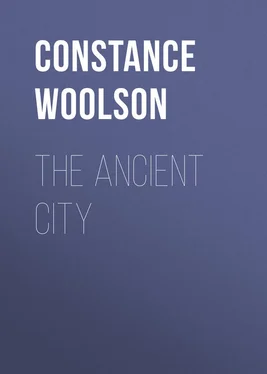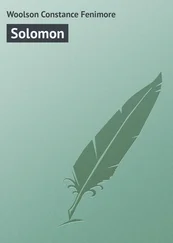Constance Woolson - The Ancient City
Здесь есть возможность читать онлайн «Constance Woolson - The Ancient City» — ознакомительный отрывок электронной книги совершенно бесплатно, а после прочтения отрывка купить полную версию. В некоторых случаях можно слушать аудио, скачать через торрент в формате fb2 и присутствует краткое содержание. Жанр: foreign_prose, на английском языке. Описание произведения, (предисловие) а так же отзывы посетителей доступны на портале библиотеки ЛибКат.
- Название:The Ancient City
- Автор:
- Жанр:
- Год:неизвестен
- ISBN:нет данных
- Рейтинг книги:4 / 5. Голосов: 1
-
Избранное:Добавить в избранное
- Отзывы:
-
Ваша оценка:
- 80
- 1
- 2
- 3
- 4
- 5
The Ancient City: краткое содержание, описание и аннотация
Предлагаем к чтению аннотацию, описание, краткое содержание или предисловие (зависит от того, что написал сам автор книги «The Ancient City»). Если вы не нашли необходимую информацию о книге — напишите в комментариях, мы постараемся отыскать её.
The Ancient City — читать онлайн ознакомительный отрывок
Ниже представлен текст книги, разбитый по страницам. Система сохранения места последней прочитанной страницы, позволяет с удобством читать онлайн бесплатно книгу «The Ancient City», без необходимости каждый раз заново искать на чём Вы остановились. Поставьте закладку, и сможете в любой момент перейти на страницу, на которой закончили чтение.
Интервал:
Закладка:
But Aunt Di was true to her colors, and never saw or heard any thing detrimental to her cause.
It was a lovely February morning; the telegraph reported zero weather in New York, but here the thermometer stood at seventy, with a fresh sea-breeze. We stepped up on to the sea-wall at the Basin, where the sail-boats were starting out with pleasure parties for the North Beach. Iris had her Captain; Aunt Diana followed closely arm in arm with Mokes; Miss Sharp, jubilant, had captured the Professor; Sara and I were together as usual, leaving John Hoffman to bring up the rear with his morning cigar.
“The material of this wall,” began the Professor, rapping it with his cane, “is that singular conglomerate called coquina, which is quarried yonder on Anastasia Island; but the coping is, as you will perceive, granite.”
“How delightful to meet the dear old New England stone down here!” exclaimed Miss Sharp, tapping the granite with an enthusiastic gaiter.
“The wall was completed in 1842 at a cost of one hundred thousand dollars, having been built by the United States government,” continued the Professor.
“And why, nobody knows,” added John, from behind.
“To keep the town from washing away, I suppose,” said Sara.
“Of course; but why should the United States government concern itself over the washing away of this ancient little village with its eighteen hundred inhabitants, when it leaves cities with their thousands unaided? The one dock has, as you see, fallen down; a coasting schooner once a month or so is all the commerce, and yet here is a wall nearly a mile in length, stretching across the whole eastern front of the town, as though vast wealth lay behind.”
“The town may grow,” I said.
“It will never be any thing more than a winter resort, Miss Martha.”
“At any rate, the wall is charming to walk upon,” said Iris, dancing along on her high-heeled boots; “it must be lovely here by moonlight.”
“It is,” replied the Captain, with a glance of his blue eyes. He was a marvel of beauty, this young soldier, with his tall, well-knit, graceful form, his wavy golden hair, and blonde mustache sweeping over a mouth of child-like sweetness. He had a cleft in his chin like the young Antinous that he was, while a bold profile and commanding air relieved the otherwise almost too great loveliness of a face which invariably attracted all eyes. Spoiled? Of course he was; what else could you expect? But he was kind-hearted by nature, and endowed with a vast fund of gallantry that carried him along gayly on the topmost wave.
“There is a new moon this very night, I think,” observed Aunt Diana, suggestively, to Mokes.
But Mokes “never could walk here after dark; dizzy, you know – might fall in.”
“Oh, massive old ruin!” cried Iris, as we drew near the fort; “how grand and gray and dignified you look! Have you a name, venerable friend?”
“This interesting relic of Spanish domination was called San Juan de Pinos – ” began the governess, hastily finding the place in her guide-book.
“Oh no, Miss Sharp,” interrupted Aunt Diana, who had noticed with disapprobation the clinging of the lisle-thread glove to the Professor’s lank but learned arm. “You are mistaken again; it is called Fort Marion.”
“It used to be San Marco,” said John.
“I vote for San Marco; Marion is commonplace,” decided Iris, sweeping away the other names with a wave of her dainty little glove.
“A magnificent specimen of the defensive art of two centuries ago,” began the Professor, taking up a position on the water-battery, and beginning to point out with his cane. “It is built, you will observe, in a square or trapezium – ”
“Let us go up and have a dance on the top,” said Iris.
“This is very instructive,” murmured Aunt Diana, moving nearer to her niece. “Miss Sharp, pray call your pupil’s attention to this remarkable relic.” For Mokes had seated himself sulkily on one of the veteran cannon which frowned over the harbor like toothless old watch-dogs. There was no objection to an army Antinous as a picturesque adjunct, Aunt Diana thought; but it was well known that there was very little gold in the service outside of the buttons, while here at hand was a Crœsus, a genuine live Crœsus, sitting sulky and neglected on his cannon!
“Oh, certainly,” said Miss Sharp, coming to the rescue. “Iris, my child, you observe that it is in the form of a trapezoid – ”
“Trapezium,” said the Professor – “trapezium, Miss Sharp, if you please.”
“ ‘That daring young man on a – ’ ” chanted the Captain under his breath, as if in confidence to the southeast tower.
“In the salient angles of the bastions are four turrets or bartizans,” continued the Professor.
“Oh yes; how interesting!” ejaculated the governess, clasping her lisle-threads together. “Partisans!”
“Bar-ti-zans,” repeated the Professor, with cutting distinctness. “The moat, as you will notice, is fortified by an internal barrier, and there is an outer wall also which extends around the whole, following its various flexuses. By close observation we shall probably be able to trace the lines of the abatis, scarp, counterscarp, and fraise, all belonging to the period of mediæval fortification.”
“The Great Work is evidently to the fore now,” whispered Sara, as we sat together on a second cannon.
“The lunette, now, is considered quite a curiosity,” said the Captain, briskly breaking in. “Miss Carew, allow me to show it to you.”
“Lunette!” said the Professor, with lofty scorn.
“That is what we call it down here, Sir,” replied Antinous, carelessly. “Miss Iris, there, is an odd little stairway there – ”
“Lunette!” repeated the Professor again. “But that is an example of the lamentable ignorance of the age. Why, that is a barbacan, the only remaining specimen in the country, and, indeed, hard to be excelled in Europe itself.”
“I have heard it described as a demi-lune,” I remarked, bringing forward my one item, the item I had been preserving for days. (I try to have ready a few little pellets of information; I find it is expected, now that I am forty years old.) The Professor took off his tall silk hat and wiped his forehead despairingly. “Demi-lune!” he repeated – “demi-lune! The man who said that must be a – ”
“Demi-lunatic,” suggested John. “Forgive me, Miss Martha; it isn’t mine, it’s quoted.”
We crossed a little draw-bridge, and passed through the ruined outwork, barbacan, lune, or demi-lune, whichever it was. Iris and the Captain had disappeared. At the second draw-bridge we came face to face with the main entrance, surmounted by a tablet bearing an inscription and the Spanish coat of arms.
“It seems to be two dragons, two houses for the dragons, and a supply of mutton hung up below,” said Sara, irreverently making game of the royal insignia of Spain. “Oh dear!” she sighed in an under-tone, “I ought to have all this written down.”
“Here are the main facts, Miss St. John,” said John Hoffman, taking out his notebook. “I collected them several years ago out of piles of authorities; they are authentic skeletons as far as they go, and you can fill them out with as many adjectives, fancies, and exclamation points as you please.” He walked on, joining the others in the inner court-yard, where the Professor, the old sergeant in charge, the piles of cannon-balls, and all the ruined doorways were engaging in a wild mêlée of information. Left alone, Sara and I read as follows: “Fort here as far back as 1565. Enlarged several times, and finally finished much as it now stands in 1755. The Appalachian Indians worked on it sixty years; also Mexican convicts. The inscription over the entrance says that the fort was finished when Ferdinand Sixth was King of Spain, and Hereda Governor of Florida. It has been many times attacked, twice besieged, never taken. Occupied in 1862 by the Fourth New Hampshire regiment.”
Читать дальшеИнтервал:
Закладка:
Похожие книги на «The Ancient City»
Представляем Вашему вниманию похожие книги на «The Ancient City» списком для выбора. Мы отобрали схожую по названию и смыслу литературу в надежде предоставить читателям больше вариантов отыскать новые, интересные, ещё непрочитанные произведения.
Обсуждение, отзывы о книге «The Ancient City» и просто собственные мнения читателей. Оставьте ваши комментарии, напишите, что Вы думаете о произведении, его смысле или главных героях. Укажите что конкретно понравилось, а что нет, и почему Вы так считаете.












